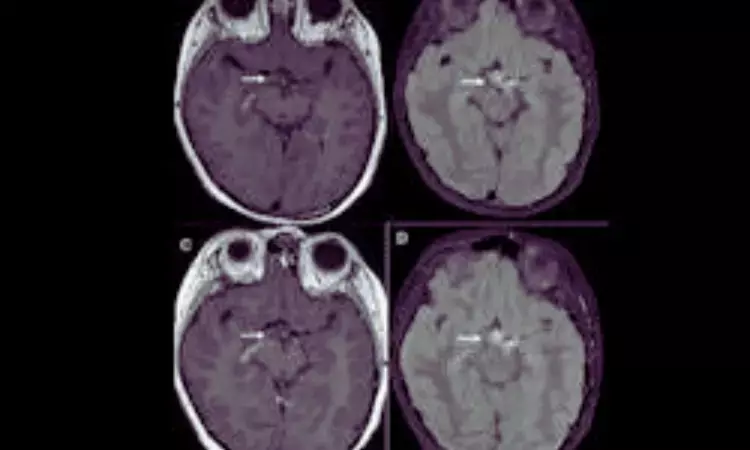- Home
- Medical news & Guidelines
- Anesthesiology
- Cardiology and CTVS
- Critical Care
- Dentistry
- Dermatology
- Diabetes and Endocrinology
- ENT
- Gastroenterology
- Medicine
- Nephrology
- Neurology
- Obstretics-Gynaecology
- Oncology
- Ophthalmology
- Orthopaedics
- Pediatrics-Neonatology
- Psychiatry
- Pulmonology
- Radiology
- Surgery
- Urology
- Laboratory Medicine
- Diet
- Nursing
- Paramedical
- Physiotherapy
- Health news
- Fact Check
- Bone Health Fact Check
- Brain Health Fact Check
- Cancer Related Fact Check
- Child Care Fact Check
- Dental and oral health fact check
- Diabetes and metabolic health fact check
- Diet and Nutrition Fact Check
- Eye and ENT Care Fact Check
- Fitness fact check
- Gut health fact check
- Heart health fact check
- Kidney health fact check
- Medical education fact check
- Men's health fact check
- Respiratory fact check
- Skin and hair care fact check
- Vaccine and Immunization fact check
- Women's health fact check
- AYUSH
- State News
- Andaman and Nicobar Islands
- Andhra Pradesh
- Arunachal Pradesh
- Assam
- Bihar
- Chandigarh
- Chattisgarh
- Dadra and Nagar Haveli
- Daman and Diu
- Delhi
- Goa
- Gujarat
- Haryana
- Himachal Pradesh
- Jammu & Kashmir
- Jharkhand
- Karnataka
- Kerala
- Ladakh
- Lakshadweep
- Madhya Pradesh
- Maharashtra
- Manipur
- Meghalaya
- Mizoram
- Nagaland
- Odisha
- Puducherry
- Punjab
- Rajasthan
- Sikkim
- Tamil Nadu
- Telangana
- Tripura
- Uttar Pradesh
- Uttrakhand
- West Bengal
- Medical Education
- Industry
Beetroot Compound Betanin Promising as Safe, Natural Alternative to Gadolinium in MRI Scans, New Study Finds

Turkey: A new experimental study suggests that betanin (a natural pigment derived from beetroot) and betanin-based contrast agents (BBCAs) could serve as promising, safer alternatives to gadolinium-based contrast agents (GBCAs) in abdominal MRI.
The research, published in the Journal of Magnetic Resonance Imaging by Dr. Yelda Özsunar and colleagues from the Department of Radiology, Faculty of Medicine, Adnan Menderes University, Aydın, Turkey, highlights the potential of these plant-derived compounds to provide effective imaging contrast while minimizing toxicity and environmental risks.
Currently, gadolinium-based agents are the standard in MRI for enhancing the visualization of tissues and organs. However, their use has raised several concerns related to gadolinium retention in body tissues, potential side effects in individuals with renal impairment, and ecological accumulation. To address these limitations, researchers have been exploring natural and biocompatible substitutes.
In this preclinical study, the team examined both betanin and BBCAs for their imaging performance, safety, and molecular characteristics. The work involved in vitro testing on human and mouse fibroblast cells, as well as in vivo experiments on 15 male Wistar albino rats and two male New Zealand albino rabbits. The MRI scans were conducted at 3-tesla field strength using spin echo and gradient echo sequences. Quantitative analyses were carried out using Microsoft Excel and GraphPad Prism 9.0.
The chemical properties of betanin and its derivative agents were analyzed through mass spectrometry, and their biological safety was evaluated using cytotoxicity assays, flow cytometry, histological assessments, and blood biochemistry tests. The agents were administered orally, intraperitoneally, and intravenously to assess their effects across different exposure routes.
The study yielded several noteworthy observations:
- Betanin exhibited stronger molecular binding efficiency and higher therapeutic potential than conventional agents.
- BBCAs demonstrated significantly lower toxicity compared to gadobutrol, a commonly used GBCA.
- Both betanin and BBCAs produced visible contrast enhancement in the gastrointestinal tract, parenchymal organs, and vascular structures, indicating effective imaging capability.
- The agents also showed antioxidative properties and a favorable safety profile, making them attractive candidates for further research.
- Notably, liver enhancement following BBCA administration was particularly prominent.
The researchers concluded that betanin and BBCA could be viable candidates for contrast-enhanced abdominal MRI, offering diagnostic clarity comparable to existing agents but with a potentially reduced risk profile.
While these findings are encouraging, the authors emphasized that this was a preliminary preclinical study, and more extensive research in clinical settings is needed to confirm the efficacy, optimal dosing, and long-term safety of betanin-based agents.
"Overall, this investigation opens an exciting avenue in MRI technology, pointing toward natural, biocompatible contrast agents that could one day replace gadolinium-based formulations, enhancing patient safety and environmental sustainability," the authors wrote.
Reference:
Özsunar, Y., Kayhan, H., Kurt, B., Esen, A. C., Aktaş, S., Tataroğlu, C., & Bilgen, M. Betanin-Based Contrast Agents for MRI: A Preliminary Experimental Study. Journal of Magnetic Resonance Imaging. https://doi.org/10.1002/jmri.70158
Dr Kamal Kant Kohli-MBBS, DTCD- a chest specialist with more than 30 years of practice and a flair for writing clinical articles, Dr Kamal Kant Kohli joined Medical Dialogues as a Chief Editor of Medical News. Besides writing articles, as an editor, he proofreads and verifies all the medical content published on Medical Dialogues including those coming from journals, studies,medical conferences,guidelines etc. Email: drkohli@medicaldialogues.in. Contact no. 011-43720751
Next Story


